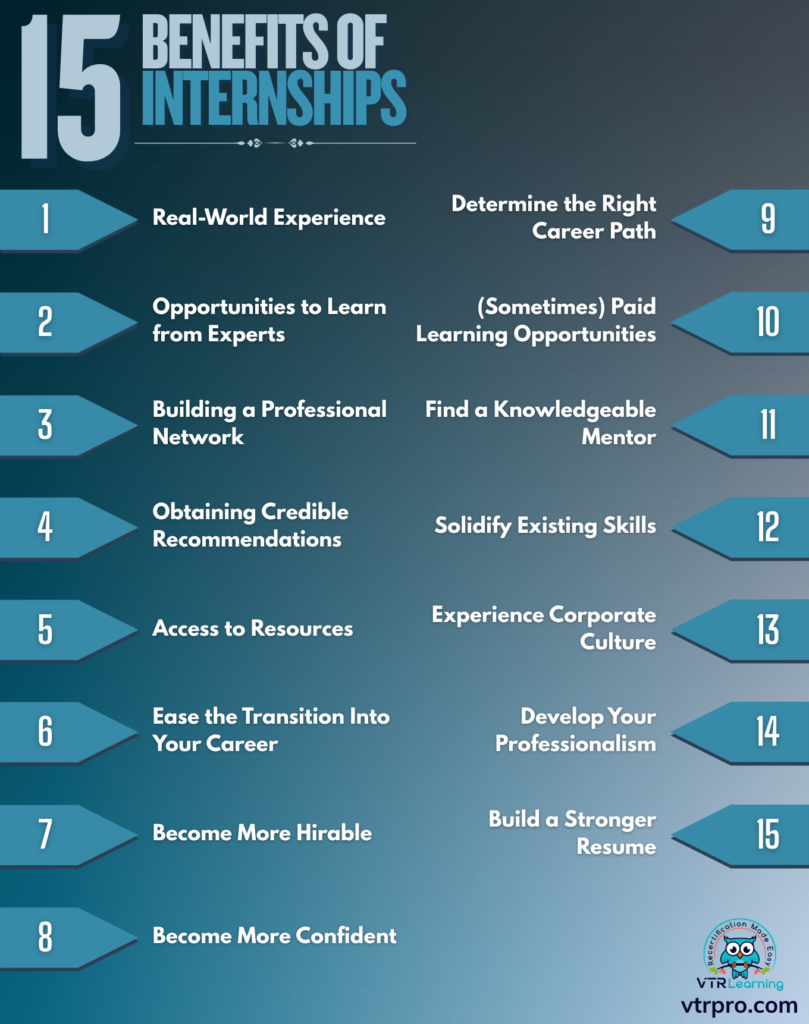
Many job candidates today recognize a common but frustrating dynamic – various entry-level positions require years of prior experience. In fact, LinkedIn found that 35% of entry-level jobs demand experience. And for hopeful candidates, this sort of “red-tape” situation becomes a major hurdle in their career aspirations. Fortunately, gaining relevant experience is only one of many benefits of internship.
However, the experiential aspects of interning aren’t the only primary advantages these individuals have in the job market. On average, college graduates who interned have salaries 12% higher than those who didn’t. Furthermore, around 70% of companies that hire interns offer a full-time position at the end of their program. So, the benefits of internship surpass merely getting past the “three-to-five years of experience” barrier.
If you’re thinking about taking the opportunity to intern for a company, we can provide plenty of reasons to commit. Because in terms of getting ahead in the job market, these programs can send you to the head of the pack.

Share this Image On Your Site
The Benefits of Internship for Aspiring Employees
1. Real-World Experience
Of course, we’ve already mentioned it, but one of the most important aspects of internship is gaining real-world experience. These on-the-job learning activities provide you with ample opportunity for growth that hiring managers look for in candidates. That way, when you come up against the “red tape” positions that seem perfect for your career, you aren’t automatically booted out. Instead, you’ll likely be one of the few individuals considered for the role while others who lack experience fall short.
Now, that’s not to paint the job market as a fish-eat-fish world – even though it definitely can turn into that. In fact, not every career step has to become a struggle between you and other people. However, companies rarely only consider one person for a position. So, if you have relevant experience that showcases your strengths and knowledge, you’ll stand a fair chance of landing jobs you want.
2. Opportunity to Learn from Experts
No matter the job, you’ll find a difference between theoretical knowledge and experiential application. There’s an interesting thought experiment called “What Mary Didn’t Know“, which might fit well here. It argues that someone born in a black-and-white room could study and learn everything possible about the color red. But on the day they finally left that room, they would have a completely new experience of the color. That’s because theoretical understanding only gets you so far.
The same idea applies equally well to a career. For example, you might understand everything about management theory. But until you’ve had to settle a dispute between employees, you don’t have that vital experiential knowledge.
One of the major benefits of internship is the opportunity to learn from those who do have that experience. And moreover, to watch that experience play out in the real world. That way, when you come up against similar situations in your own career, you can fall back on that knowledge. Taking the chance to glean insight from people who have actually been in the situations you aspire to can become incredibly helpful.
3. Building a Professional Network
One thing most successful individuals recognize is the vital importance of their professional networks. In fact, around 70% of job openings never post to the public, because they fill through networking. So, from bypassing the application process to developing your communication skills, this practice stands essential.
Interning provides the perfect opportunity to start building a robust and helpful professional network. These contacts might range from managers and company leaders to other interns – even those in completely different industries. And that’s exactly how it should be. Building this sort of interconnected web puts you in a prime position when it comes to finding job opportunities, learning new skills, and keeping up with industry developments.
So, even after your formal internship ends, you’ll retain the contacts you made during the process. And fostering these relationships can prove extremely beneficial down the line, both for your career and for the sake of making new friends.
4. Obtaining Credible Recommendations
Whether you want to hire on with the company you intern at or work for another organization entirely, a credible recommendation works wonders. Especially if it comes from a widely-respected source. For example, a direct manager from an internship could let company leaders know you’d make a great fit after the program ends. But they could also point you toward other companies and offer to write a letter of recommendation.
Naturally, this comes as a result of seeing your personal and professional progress across the length of your time together. And that’s exactly why this is one of the benefits of internship. Professors and educators can write similar recommendations. However, they rarely have opportunity to see your actual work in a real-world setting.
That’s not necessarily to say recommendations from educators have less credibility. However, hiring departments want to know that you can do the job they bring you on to perform. So, someone who’s seen your work firsthand can make a major difference with a simple word of recommendation.
5. Access to Resources
One of the great parts of interning is the access you gain to important resources. Of course, these come in a wide variety of formats, from learning materials and industry insights to personal advice from experienced individuals. And naturally, the organization you intern for will largely determine your access level. However, the purpose of an internship is largely to help you succeed while performing great work. So, the company should naturally want to give you access to everything that could lead to that outcome.
For example, some organizations might provide subscriptions to learning services that focus on core skills you’ll need to develop. Others might grant you access to a massive library of in-house materials designed to hone your soft skills. The actual specifics vary between industry and company. But if offered the opportunity to access helpful resources, make sure you take advantage of it while it lasts.
6. Ease the Transition Into Your Career
Of course, most of the benefits of internship might work together to help ease the transition into your career. So, it might not seem an advantage in and of itself. However, it’s still important enough to make mention of it here. By providing experience, resources, networks, and everything else you need to succeed, internships greatly reduce stress of moving into a full-time position.
For example, imagine the difference between starting a new job with no prior experience and going full-time with a company you’ve already worked at for eight months as an intern. The level of anxiety surrounding that shift would be immense if you were going in with no clue what to expect. However, an internship provides a low-risk opportunity to start learning on-the-job before moving into a more permanent role. That way, when you do make the transition, it comes much easier.
And even if you end up working for a different company than the organization where you interned, your level of knowledge and real-world insight will help all the same.
7. Become More Hirable
Maybe it goes without saying at this point, so we won’t say more than necessary here. But one of the most recognizable benefits of internship is the strength of your worth as a job candidate. Naturally, this comes as a result of the knowledge and experience you gain during your time doing on-the-job work. Learning from experts and forming networks helps you stay more attractive as a potential hire, which leads to better job opportunities and pay.

8. Become More Confident
One of the best advantages for interns is the boost of confidence that comes with gaining relevant experience. Whether you see the effects when you move into a full-time position or before, it’s great to feel capable. Especially in a job environment that demands experience and capability.
While internships aren’t necessarily risk-free, they at least represent opportunities to learn – and fail – without significant consequence. Of course, that doesn’t mean interns should throw caution to the wind; quite the opposite. It means they have the freedom to pursue growth without fear of catastrophic ramifications. And through this process of learning, they can become more confident in their abilities to do things they way they need.
This translates to stronger skills, better job opportunities, and greater security in a career.
9. Determine the Right Career Path
Part-and-parcel with increased confidence, internships can help you determine whether the road you’re taking is the right choice. Sometimes, you think you want to go into a certain field only to realize after a great deal of hard work that it wasn’t a good fit. Internships offer the opportunity to determine that before losing precious time. Alternatively, you might come out of the process even more sure that it’s the right job for you. But the point remains the same – getting first-hand experience in a real job setting helps you navigate toward the right destination.
10. (Sometimes) Paid Learning Opportunities
While the career and learning benefits of internship stand whether it’s a paid opportunity or not, compensation is still helpful. Fortunately, around 60.8% of all internships in the United States pay, and for good reason. After all, paid internships are 32% more likely to lead to full-time positions than those that don’t compensate. So, if the best of the intern is at the heart of the process, it makes sense to pay. Besides, companies can often expect better output when they motivate financially. And to that extent, it’s a win-win situation.
Moreover, the opportunity to learn while being paid is something major organizations promote anyway. Because they know that the entire team benefits when their workers become more educated. So, doing the same for interns who could potentially help shape the future of the company makes sense.
11. Find a Knowledgeable Mentor
Beyond the educational experience of an internship itself, one of the best, longer-lasting benefits is finding a mentor. This is a person who can help guide and shape your career aspirations, providing insight and pointing the way forward. In many ways, this surpasses the internship itself and establishes a much longer relationship where a successful individual can pass along their knowledge to the next generation. And to that extent, it proves mutually beneficial to both participants.
Even if you don’t end up with a mentor from the same organization you intern at, building your professional network during the process can open up many other doors. That way, you eventually find the right person to help lead you along the path and bolster your abilities.
12. Solidify Existing Skills
Naturally, you probably won’t go into an internship completely void of skill. You already have various soft skills, and potentially even core abilities related to the job you intend to do. And one of the benefits of internship is that you have the opportunity not only to learn new skills but also strengthen those you already have.
Especially if you end up moving into the field, solidifying these capabilities early on during a training period is helpful. It builds your confidence, makes you appear more attractive to hiring managers, and provides a foundation to build upon. Because, after all, most industries shift around. The necessary skills change or develop, and you’ll need to grow with them.
Even if your field isn’t as malleable as others, strengthening your existing abilities through an internship opportunity is great. Because it pits your skills against the real world to show you how you can better develop.
13. Experience Corporate Culture
Another advantage interns have over those with no experience is the introduction of corporate culture. Just like other aspects of experiential knowledge, you don’t understand how a company works just from studying it. You need to get into the midst of an organization to actually begin to recognize its culture. And because adapting and fitting in with a culture is such an important aspect of career success, doing this early on can become essential.
14. Develop Professionalism
Let’s face it – college-age students aren’t always the most mature people on the planet. And if you’re in that group reading this, please don’t be offended. Because it varies from one individual to another. But even those wise beyond their years might not fully understand the professionalism necessary in the job the hope to go into.
An internship provides the perfect experience to learn the sort of professionalism expected of employees in the corporate world. It gives an opportunity to watch how actual employees interact with others and then emulate them as you do the same.
Of course, the level of professionalism needed might change from one company culture to another. So, you shouldn’t expect every place to operate at the same level. However, since many employees have to act as the face of their organization when dealing with those outside their company, knowing how to communicate appropriately is essential.
15. Build a Stronger Resume
If you don’t end up working for the same company you intern for, the experience can still benefit the job hunt. After all, listing your relevant experience on your resume makes you appear much more attractive to hiring managers at other companies. Even when those positions don’t necessarily require prior work experience.
Think about it – if you were faced with two potential employees, which one would you choose?
- Candidate 1: Has a bachelor’s degree with no work history available.
- Candidate 2: Has a bachelor’s degree with eight months’ experience working for another company in the same field.
The answer should be fairly obvious. Beefing up your resume with an internship is a great way to set yourself apart from other job applicants and secure your career.
VTR Learning – A Virtual Internship
When you think of continuing education, you probably don’t think of on-the-job training. It’s probably more akin to a forum you have to sit through with a boring slideshow presentation.
But VTR Learning takes that model and turns it on its head. We offer accredited business courses that take an experiential approach to learning. So, playing the part of an intern at a company called Central Products, you get to see business play out as it might in the real world.
It might not be a true internship, but if you’re looking to brush up on specific skills or lay a foundation for more learning, it’s a perfect option. Especially if you’re having a difficult time finding an internship and want to get started on building your skills. Be sure to check out our shop to see if we have a course that meets your needs.
Last Updated:





